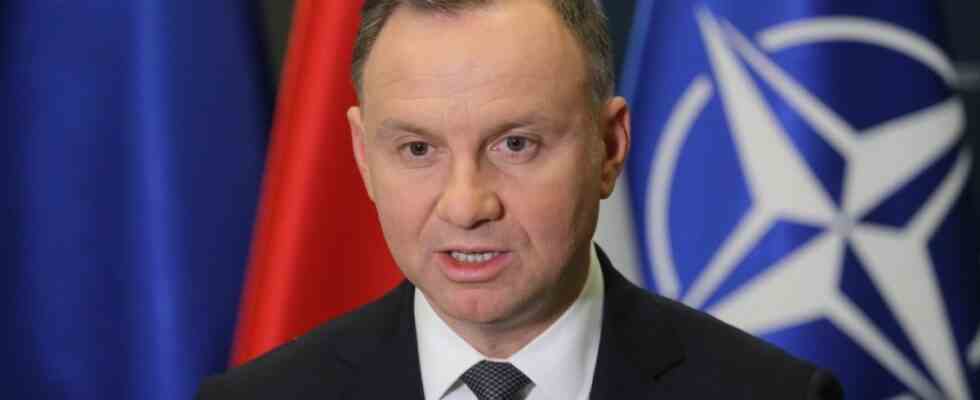It is after midnight when the Polish Ministry of Foreign Affairs finally declares: “At 3:40 p.m. in the village of Przewodów, Hrubieszów County, Lubelskie Voivodeship, a Russian-made rocket crashed, killing two citizens of the Republic of Poland.” The Russian ambassador will be summoned.
Polish President Andrzej Duda hastened to tweet afterwards: “We have no clear evidence of who launched the missile.” Russian-made missiles are used by both Russians and Ukrainians. Investigations are in progress.
In Warsaw people are careful. Careful not to make a mistake now.
Two hours earlier, government spokesman Piotr Müller had only spoken of an explosion, which he had not said was triggered. Ukrainian President Volodymyr Zelenskiy had already declared that what Ukraine had long warned of had happened. Moscow is expanding the war to other countries, there is a “need for action”. Russia had already denied responsibility.
And while Poland’s neighboring countries were already expressing their solidarity and taking the first reports of rocket hits as proven, Warsaw was still silent. The National Security Council met, followed by a government session, then a brief press conference, no questions allowed. The rarely quiet right-wing populist government appears reserved. For Article 5, the case of the NATO alliance, that becomes clear in the evening, no one wants to see a reason. First of all, reference is made to Article 4: Consultations with the partners in the defense alliance.
Warning about unconfirmed reports
The evening before the government withdrew to its deliberations, government spokesman Piotr Müller had urgently warned against spreading any unconfirmed reports. What happened anyway. That was in Poland’s largest daily newspaper Gazeta Wyborcza to read: “According to our information, a missile damaged by Ukrainian anti-aircraft defenses may have landed in Przewodów. Therefore, the missile changed its trajectory and flew to the Polish side.”
On Tuesday, the Russians carried out heavy attacks on dozens of Ukrainian cities and infrastructure, leaving millions of people without electricity. There were also attacks in western Ukraine, near Poland. The theory has surfaced in other media that the Russians may have accidentally programmed the missile incorrectly. And Justice Minister Zbigniew Ziobro from the far-right coalition party has already tweeted about a “missile explosion” and that his prosecutors would investigate everything on the spot.
In the evening, in Przewodów, with its few hundred inhabitants, the fire brigade, police and local politicians from the Lublin Voivodeship are still there. The rocket killed two men, one was about to use the tractor to weigh corn, the other was waiting for him, local media reports. A building used to dry grain is completely destroyed. The projectile tore a two meter deep crater, the elementary school is said to be only half a kilometer away from here.
Poland has now put its armed forces on increased alert, which may mean that soldiers are available in the barracks. Prime Minister Mateusz Morawiecki announced in the evening that some units were in increased combat readiness, especially the air force. The Mayor of Warsaw, Rafał Trzaskowski, convened a crisis team. Infrastructure and, above all, communication channels urgently need to be protected, he said.
Neighboring countries condemn the “escalation”
But while some of Poland’s neighboring countries in particular are rushing to assure their solidarity and to condemn the attack as sharply as possible, Polish politicians remain deliberately calm. Slovakian Defense Minister Jaroslav Naď writes: “Russia’s ruthlessness is getting out of control.” That has to stop. Naď’s Czech counterpart Jana Černochová and Latvian Foreign Minister Edgars Rinkēvičs speak of an “escalation”.
Prime Minister Morawiecki turns to the Poles during the night and warns them “to remain calm in the face of this tragedy.” Chaos is a weapon that Russia uses. “Let’s be careful, let’s not be manipulated.” President Andrzej Duda, who had spoken to US President Joe Biden and Federal Chancellor Olaf Scholz on the phone, echoed the warnings in his speech. “Please be quiet,” he said at night. “It is important that we act prudently in this difficult situation.”
The National Security Council in Poland is meeting again this Wednesday. The NATO ambassadors are also meeting and the EU heads of state and government want to meet at the G20 summit in Bali. Duda repeatedly affirmed that all allies stood by Poland. “It’s going to be a long night, tomorrow is another important day,” Duda said goodbye to the Poles in his speech well after midnight.

